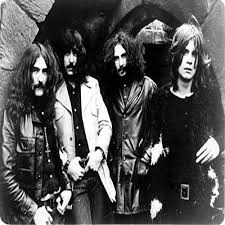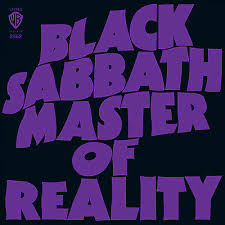Master of Reality
| Black SabbathMaster of Reality
Master of Reality is the third studio album by English rock band Black Sabbath, released on 21 July 1971. It is widely regarded as the foundation of doom metal, stoner rock, and sludge metal. It was certified double platinum after having sold over 2 million copies. Master of Reality was Black Sabbath's first and only top 10 album in the US until 13, forty-two years later.-"Wikipedia"
Critic Reviews
Show All-
 All Music
All Music
Much of Master of Reality finds the band displaying a stronger moral sense, in part an attempt to counteract the growing perception that they were Satanists. Listeners get sharply contrasting tempos in the rumbling sci-fi tale "Into the Void," which shortens the distances between the multiple sections of the band's previous epics.
-
 Metal Archives
Metal Archives
Master of Reality is a perfect album by every standard. It shows Sabbath at their best as musicians and songwriters while setting an insanely high bar for all other heavy metal acts to follow. Some could deem the album too short, especially with two of eight songs being short interludes, but anything more would just be superfluous.
-
 Rolling Stone
Rolling Stone
The sound, with a couple of exceptions, has evolved little if at all. The thick, plodding, almost arrhythmic steel wool curtains of sound the group is celebrated and reviled for only appear in their classical state of excruciating slowness on two tracks, “Sweet Leaf” and “Lord of This World,” and both break into driving jams that are well worth the wait.
-
 Classic Rock Review
Classic Rock Review
Leading the group’s sound was guitarist Tony Iommi, who expanded his instrumentation to include keyboards and flute and tuned his guitar down a few semi-tones to produce a darker sound. The material on this eight-song album is also very diverse in themes, styles and rhythms.
-
 Sputnik Music
Sputnik Music
Despite not radically switching up their formula, the newly down tuned guitars and bass guitars opened new possibilities for the band. Their heavy, sludgy sound proved to once again be a hit with fans, and support for the band remained as strong as ever. Master of Reality is an excellent album, essential for fans of metal, and probably my favourite Ozzy-era Sabbath album.
-
 Kerrang
Kerrang
Confrontational, immersive, and somehow tuned down even lower than its predecessors, Sabbath’s third full-length album is where fairweather listeners drop off and the devoted begin their true love of the band. As such, it is the ultimate album about being a Black Sabbath fan, booming with the kind of raw nihilist anxiety and outlaw attitude that made this band the answer to so many people’s lifelong question.
-
 Loudwire
Loudwire
Master of Reality was filled with multifaceted riffs, meandering basslines and nasal, yearning vocals that served as a natural inspiration to early stoner rock groups like Pentagram, Saint Vitus and the Obsessed. Although nobody complained about the length of the album, by today’s standards Master of Reality’s 32-minute running length would be considered a bit concise, especially since two of the songs are instrumentals that clock in at two minutes combined and there were only eight songs on the original pressing. For listeners at the time, however, that was more than enough bludgeoning.
-
 Metal Forces Magazine
Metal Forces Magazine
Master Of Reality is suddenly the heaviest album on the planet; stoned on doom and lost love it writhes like the greatest concrete serpent that ever lived – and still does – crushing towns in its wake.
-
 The Guardian
The Guardian
It's a surprisingly limber album, given momentum by the imaginative, almost jazzy drumming of Bill Ward (in Children of the Grave, his percussive patterns thrillingly transform what risks being a boogie-by-numbers). As with all early-70s Sabbath records, there are three acoustic numbers you can live without, but the rest is untouchable stuff: more aggressive than the MC5, less stodgy than Zeppelin.



Rate This Album and Leave Your Comments